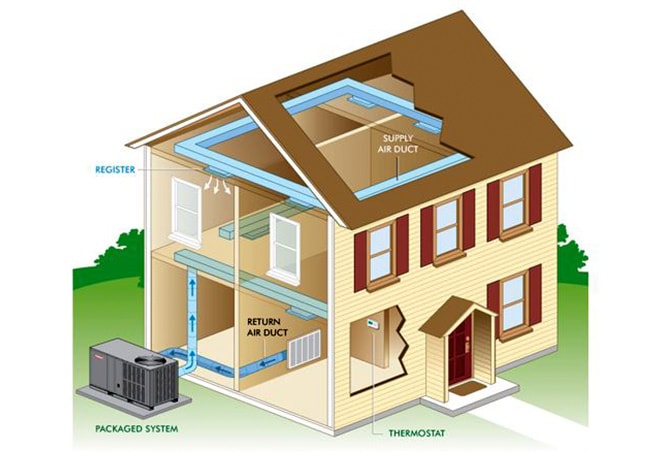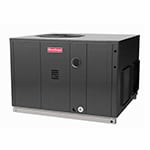
Packaged Units 101
If you live in a southern part of the United States, you've probably seen a packaged air conditioner either on top of or next to a business or home without realizing it.
In fact, HVAC equipment and the language used to describe it can be quite confusing for most people. One of the most common questions we hear is, "What's a Packaged HVAC unit?"
What is a Packaged Unit?
At first glance, a packaged unit looks very similar to an outdoor air conditioning or heat pump condenser, with one big difference -- there aren't any indoor devices that connect to it. Instead, what you see is what you get.

Image: Goodman Manufacturing
A packaged unit is an all-in-one HVAC appliance that is spatially efficient, making it ideal for situations where indoor square footage is at a premium. It is installed outside the home (either on the roof or the side) where it produces conditioned air that is forced into a series of ducts running throughout the house.
Packaged Unit Types
 Just like central forced-air systems, packaged units come in all types of configurations. Whether you reside in a coastal region and only need air conditioning or are farther north and need a furnace, you'll find all the options to match your specific needs.
Just like central forced-air systems, packaged units come in all types of configurations. Whether you reside in a coastal region and only need air conditioning or are farther north and need a furnace, you'll find all the options to match your specific needs.
- Packaged Air Conditioners: The compressor, coils, and air handler are all housed in a single-box cabinet. The packaged air conditioner can also provide some warmth by using an electrical heating strip.
- Packaged Heat Pumps: A packaged heat pump uses heat pump technology to cool and heat your home.
- Packaged Gas-Electric: The packaged gas-electric unit combines an (electric) air conditioner with gas-powered furnace performance.
- Packaged Dual-Fuel: The packaged dual fuel system contains a heat pump, capable of heating and cooling, with a gas furnace. This type of packaged system optimizes the heating source for all conditions.
CENTRAL Forced-Air vs. PACKAGED Forced-Air
The most significant difference between a traditional "Central" system and a "Packaged" one, is that in a central system, the components are separated from one another with equipment placed both inside and outside the home.
A central air conditioner, for example, works with a condenser placed outside and an indoor coil, blower, and cabinet inside the home. That's why "central air" units are also referred to as "split systems." On the flip side, a packaged unit will have all of the heating and cooling components placed together or "packaged" into a single standalone unit.
You can quickly tell if your home uses a packaged unit because it will be:
1) Larger than a split air conditioner condenser.
2) Installed outside the home, either on the roof or side with no indoor components.
3) Connected to the unit using large rectangular or circular ductwork.
Which Type Should I Buy?
Typically, people replace their existing HVAC equipment with the same kind. However, it's important to know why you should choose a particular type of appliance over another.
Almost every home in the country requires a reliable source of heat. So, if you're in Miami or a similar climate and you don't have a separate device to heat your home, the best option would be a packaged heat pump. It's the most energy-efficient in areas that don't see freezing temperatures and where natural gas isn't readily available.
If your habitat is more inland, like the Midwest, then a dual-fuel packaged unit would be the best option. It'll have the capacity to quickly cool and heat the home in Summer and Winter while taking full advantage of the heat pump's higher efficiency during the transitionary months.
No matter where you reside -- if you live in a home where space is limited, a packaged unit may be exactly what you need. If you ever have questions or need help deciding which HVAC products will be the best for your home, we're here to help!
Central Forced-Air Buyer's Guide
HVAC-101| Gas Furnaces-101| Heat Pumps-101| Packaged Units-101| Air Conditioning-101| Air Handlers-101

